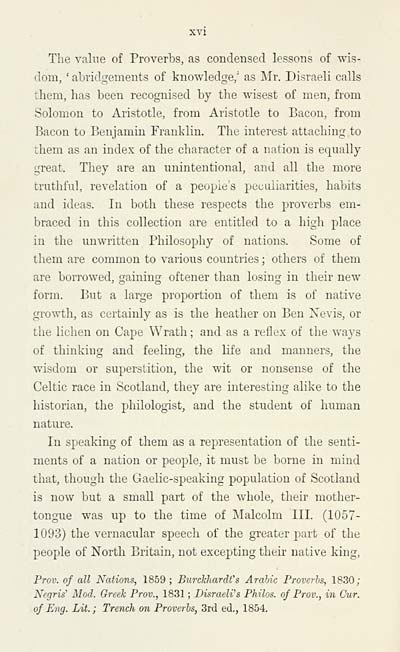Download files
Complete book:
Individual page:
Thumbnail gallery: Grid view | List view

The value of Proverbs, as condensed lessons of wis-
dom, ' abridgements of knowledge,' as Mr. Disraeli calls
them, has been recognised by the wisest of men, from
Solomon to Aristotle, from Aristotle to Bacon, from
Bacon to Benjamin Franklin. The interest attaching to
them as an index of the character of a nation is equally
great. They are an unintentional, and all the more
truthful, revelation of a people's peculiarities, habits
and ideas. In both these respects the proverbs em-
braced in this collection are entitled to a high place
in the unwritten Philosophy of nations. Some of
them are common to various countries ; others of them
are borrowed, gaining oftener than losing in their new
form. But a large proportion of them is of native
growth, as certainly as is the heather on Ben Xevis, or
the lichen on Cape Wrath ; and as a reflex of the ways
of thinking and feeling, the life and manners, the
wisdom or superstition, the wit or nonsense of the
Celtic race in Scotland, they are mteresting alike to the
historian, the philologist, and the student of human
nature.
In speaking of them as a representation of the senti-
ments of a nation or people, it must be borne in mind
that, though the Gaelic-speaking population of Scotland
is now but a small part of the whole, their mother-
tongue was up to the time of Malcolm III. (1057-
1093) the vernacular speech of the greater part of the
people of North Britain, not excepting their native king,
Prov. of all Nations, 1859; Burckhardfs Arabic Proverbs, 1830;
Negris' Mod. Greek Prov., 1831 ; Disraeli's Philos. of Prov., in Cur.
of Eng. Lit. ; Trench on Proverbs, 3rd ed., 1854.
dom, ' abridgements of knowledge,' as Mr. Disraeli calls
them, has been recognised by the wisest of men, from
Solomon to Aristotle, from Aristotle to Bacon, from
Bacon to Benjamin Franklin. The interest attaching to
them as an index of the character of a nation is equally
great. They are an unintentional, and all the more
truthful, revelation of a people's peculiarities, habits
and ideas. In both these respects the proverbs em-
braced in this collection are entitled to a high place
in the unwritten Philosophy of nations. Some of
them are common to various countries ; others of them
are borrowed, gaining oftener than losing in their new
form. But a large proportion of them is of native
growth, as certainly as is the heather on Ben Xevis, or
the lichen on Cape Wrath ; and as a reflex of the ways
of thinking and feeling, the life and manners, the
wisdom or superstition, the wit or nonsense of the
Celtic race in Scotland, they are mteresting alike to the
historian, the philologist, and the student of human
nature.
In speaking of them as a representation of the senti-
ments of a nation or people, it must be borne in mind
that, though the Gaelic-speaking population of Scotland
is now but a small part of the whole, their mother-
tongue was up to the time of Malcolm III. (1057-
1093) the vernacular speech of the greater part of the
people of North Britain, not excepting their native king,
Prov. of all Nations, 1859; Burckhardfs Arabic Proverbs, 1830;
Negris' Mod. Greek Prov., 1831 ; Disraeli's Philos. of Prov., in Cur.
of Eng. Lit. ; Trench on Proverbs, 3rd ed., 1854.
Set display mode to: Large image | Transcription
Images and transcriptions on this page, including medium image downloads, may be used under the Creative Commons Attribution 4.0 International Licence unless otherwise stated. ![]()
| Early Gaelic Book Collections > Blair Collection > Collection of Gaelic proverbs and familiar phrases > (20) |
|---|
| Permanent URL | https://digital.nls.uk/76277510 |
|---|
| Description | A selection of books from a collection of more than 500 titles, mostly on religious and literary topics. Also includes some material dealing with other Celtic languages and societies. Collection created towards the end of the 19th century by Lady Evelyn Stewart Murray. |
|---|
| Description | Selected items from five 'Special and Named Printed Collections'. Includes books in Gaelic and other Celtic languages, works about the Gaels, their languages, literature, culture and history. |
|---|

